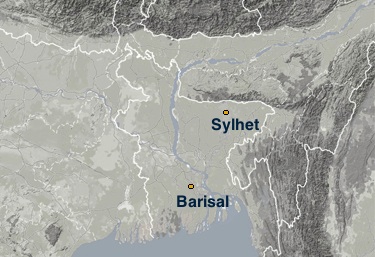Shafik’s Teashop, Ghungiar-Gaon Bazar, Shalla, Sunamganj, Sylhet. 16 August 2012. Linkon and Shishu Mia
keno piriti baraila bondhu
mon re tumi kupathe jaiyo na
We first met Linkon when we went to their house to record his mother and other women singing the Padma Puran on our first day in Dumra village in the Shalla region of Sunamganj, Sylhet. Our friend and guide on this trip, Suman Kumar Das, also lives in this village although his family originates from neighbouring Sukhline village; Suman belongs to a family of school teachers. Suman now lives in Sylhet town and works as the Sylhet correspondent of Prothom Alo, a widely circulated daily of Bangladesh. Suman is also a prolific writer and has already published many books, mainly on the folk poets of his region; even won awards for his books. Barely 30, he is the pride of Shalla. Linkon’s parents look up to him for guidance; they believe that Suman will show the way to their bright and talented eldest son and take him to a world beyond their enclosed haor.
In these monsoon months, the haor becomes an archipelago. Water from the streams and rivers of the surrounding hills gathers in the low-lying plains of this region and stays that way for months while the more elevated villages float like little islands. Shalla is one such island and it holds several villages—Sukhline, Dumra, Ghungiar Gaon Bazar.
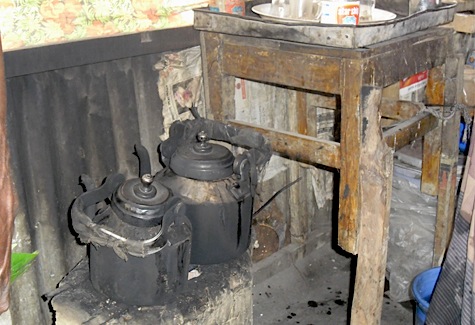
Shafik’s Teashop at Ghungiar-Gaon Bazar, Shalla
That was the evening of 15 August 2012. We had arrived by boat earlier in the day and had set out to record the reading of the Manasa Mangal—they call it the Padma Puran here. Linkon’s house was our first stop. In their small দশ ফুট বাই দশ ফুট room, Linkon’s parents live with their sons. Most of the space is taken up by the beds (we sat on one of them). There is also a desk with books and posters and pictures on the walls. Linkon’s father, Khitishbabu, had a business in book binding; now he makes paper boxes for packaging. Stacks of undelivered boxes lined the room. There is no limit to how much such a space can hold. In the middle of it all, Manasa presided, with coloured paper decoration around her. The women sat singing her praise. Linkon, who now goes to college in Sylhet, had come home, as he knew we were coming. He was doing most of the running around, organizing tea and food for us. There were people outside watching us through the open door. For Linkon, there was pride in this whole affair; he now knows such people, from his stay ‘abroad’. When there was time for introductions, Suman told us that Linkon was a very talented singer.
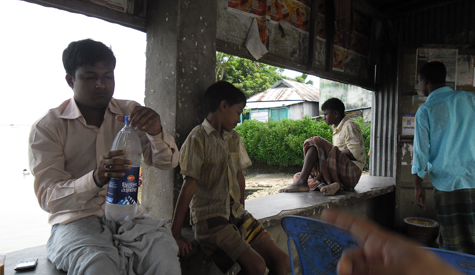
Suman
On a regular day in the city, Suman and Linkon usually meet in the office-cum-bookshop of Shubhendu Imam, alias Hannan bhai, writer and publisher and proprietor of Boipotro, the leading publishing house of Sylhet. Sumon has found Linkon a job in Hannan bhai’s shop, so the boy can support himself while he studies in an undergraduate college. Sumon often goes there after work to meet with the city’s intellectuals. Linkon naturally comes in contact with such people. Sometimes the ‘bhodrolok’ gathering asks him to sing. When he finishes college, Linkon will be his family’s first graduate. Perhaps he will find a better job then, or go for further studies. But he would prefer to become a singer. He watches television, and aspires to go one day to the young talents shows. He loves the voice of Sonu Nigam. Bollywood has planted a dream in Linkon.
The next day we went by boat to Haripur and Nainda villages, but came back to Shalla by the evening. Then we met at Shafik’s tea shop in Ghungiar Gaon Bazar. The tea shop is on the edge of what has now become a river, beside the ‘Jatri Chhauni’, where passengers wait for the next boat. Here, as evening descended, between cups of sweet tea, Linkon sang for us. The song here is a composition of Shah Abdul Korim, the legendary composer of this region, who died at 93 only a few years ago. Linkon sings beautifully, with great tenderness, but from his singing you wouldn’t think of him as belonging to this region. His voice does not carry marks of the place which birthed him, and which is steeped in the Padma Puran, dhamail, bichchhedi, murshidi gaan. Later we said amongst ourselves: লিংকনের গলা থেকে অঞ্চল মুছে গেছে। Linkon could belong anywhere now. Is this satellite television’s gift to civilization? It wasn’t just a matter of style of singing; Linkon after all was singing a song of his own region. The shift seemed to have taken place in the interpretation. And it wasn’t even a conscious interpretation, in my view. It was more a matter of processing and packaging.
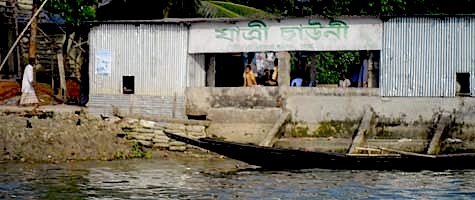
Jatri Chhauni
Korim Shah’s songs, as it is with songs of all mystic poets, have layers of meaning attached to them. On the surface they might be talking about separation and longing, but what this separation is, who or what from, is not spelt out in so many words. You make your own meaning out of a song, depending on who you are and where you are located; also what you want it to mean at a particular moment—a rich composition allows for so much multiplicity of meaning. Linkon’s song, it seemed to me, was losing this complexity, the bhav had changed, it had been reduced to a simple song of love. Beautiful and tender for sure, but made for that notorious ‘box’ as if. Back in 2006, we had met another beautiful and tender singer in Debicharan, Rangpur in the north of Bangladesh, Bipin Roy. He had sung a song not from his region, but from Netrokona in the east. Amar gaaye joto dukkho shoy. song Again there were no signs of a ‘home’ in the song. It could belong anywhere.
Interestingly, while Linkon was singing, a small group of passers-by had gathered in the shop. They were listening to the music but they were also curious about us. Who we were, what we were doing, what instrument Sukanta was holding in his hand, why he was wearing headphones, why we talked in this strange and unfamiliar way—they wanted to know. Our dialect confused them. This wasn’t Sylheti, for sure, but could this be Bengali? We were from India. So, was this Hindi maybe? You speak Bangla in Kolkata, they asked?
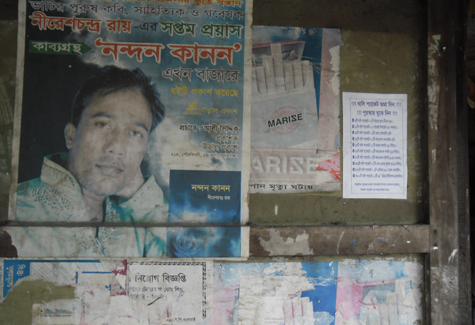
Poster announcing a new book of poems by a local poet
One man was more brave than the others. He said he would like to sing too. His name was Shishu Mia, he said. Then he sang. Again it had to be a composition of their ‘national’ poet—Shah Abdul Korim. And when he sang, every bit of his song and his voice became the region. He got his words mixed up, his lines were in disarray, but that roughness, that play with tempo, those cries—they can only come from someone who is rooted in this place. Linkon, by comparison, had become an outsider. I remembered Helal Miah in London. So far from the land of his ancestors, and yet so rooted. Is root then something we can carry with us where we go, and nurture in our new homelands?
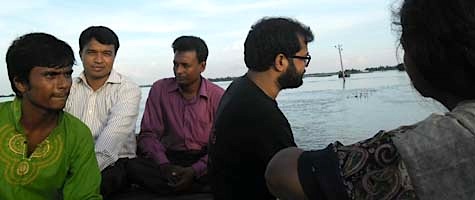
From left: Linkon, Dipu, Dharani, Sukanta, Moushumi
Linkon’s song:
কেন পিরিতি বাড়াইলায় রে বন্ধু
ছেড়ে যাইবায় যদি?
কেমনে রাখিব তোর মন
আমার আপন ঘরে বাদী রে বন্ধু?
ছেড়ে যাইবায় যদি।
পাড়াপড়শি বাদী আমার, বাদী … ননদী
মরণজ্বালা সইতে না’রি
দিবানিশি কাঁদি রে বন্ধু,
ছেড়ে যাইবায় যদি।
কারে কী বলিব আমি,
নিজে অপরাধী।
কেঁদে কেঁদে চোখের জলে
বহাইলাম নদী রে বন্ধু,
ছেড়ে যাইবায় যদি।
বাউল আবদুল করিম বলে,
হলো এ কী ব্যাধি?
তুমি বিনে এ ভূবনে
কে আছে ঔষধী, এ বন্ধু
ছেড়ে যাইবায় যদি?
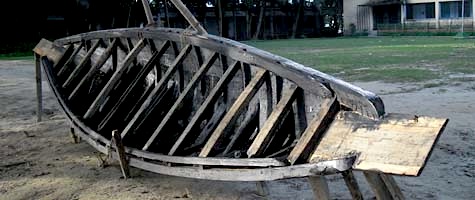
A boat out of water
And Shishu Mia sang:
মন রে তুমি কুপথে যাইয়ো না।
কুপথে যাইয়ো না তুমায় করি রে মানা
গেলে পাইবে লাঞ্ছনা।
তুমি চলো হুশ করে নইলে পড়বে বিপদে,
মন রে তুমি কুপথে যাইয়ো না।
সুজা সরল রাস্তা ধরো
কাম কামিনীর সঙ্গ ছাড়ো রে।
করিম কয় বা ভুল,
তুমি ঠিক রাখিও মূল
নইলে লাগবে গণ্ডগোল।
মন রে, মন রে তুমি কুপথে যাইয়ো না।
তুমি সরল সুজা রাস্তা ধরো
ছয় রুহুকে (রীপু?) বাধ্য করো রে
তুমি করিয়া সিজন [সৃজন?]
তুমার নাম করো স্মরণ, মুর্শীদো।
মন রে তুমি কুপথে যাইয়ো না।
কুপথে যাইয়ো না তুমায় করি রে মানা
গেলে পাইবে লাঞ্ছনা ।
মন রে, মন রে তুমি কুপথে যাইয়ো না।
Written in 2014.
- Saptiguri, North Bengal. 27 November 2003. Nirmala Roy
- Bolpur, Birbhum. 25 November 2003. Nimai Chand Baul
- Kolkata. 4 September 2019. Purnadas on Nabani Das Baul
- Surma News Office, Quaker Street, East London. 27 February 2007. Ahmed Moyez
- Ambikapur, Faridpur, Bangladesh. 29 April 2006. Hajera Bibi
- Sylhet, Bangladesh. 22 April 2006. Chandrabati Roy Barman and Sushoma Das
- Sylhet, Bangladesh. 21 April 2006. Arkum Shah Mazar
- Sylhet, Bangladesh. 20-21 April 2006. Ruhi Thakur and others
- Jahajpur, Purulia. 27 February 2006. Naren Hansda and others
- Faridpur, Bangladesh. 24 January 2006. Binoy Nath
- Uttar Shobharampur, Faridpur, Bangladesh. 22 January 2006. Ibrahim Boyati
- Baotipara, Faridpur, Bangladesh. 21 January 2006. Kusumbala Mondal and others
- Kumar Nodi, Faridpur, Bangladesh. 21 January 2006. Idris Majhi and Sadek Ali
- Debicharan, Rangpur, Bangladesh 18 January 2006 Anurupa Roy & Mini Roy, Shopon Das
- Mahiganj, Rangpur, Bangladesh. 17 January 2006. Biswanath Mahanta & Digen Roy
- Chitarpur, Kotshila, Purulia. 28 November 2005. Musurabala
- Krishnai, Goalpara, Assam. 30 August 2005. Rahima Kolita
- Chandrapur,Cachar. 28 August 2005. Janmashtami
- Silchar, 25 August 2005, Barindra Das
- Kenduli,Birbhum. 14 January 2005. Fulmala Dasi
- Kenduli, Birbhum. 13 January 2005. Ashalata Mandal
- Shaspur, Birbhum. 8 January 2005. Golam Shah and sons Salam and Jamir
- Bhaddi, Purulia. 6 January 2005. Amulya Kumar, Hari Kumar
- Srimangal, Sylhet. 27 December 2004. Tea garden singers
- Sylhet, Bangladesh. 26 December 2004. Abdul Hamid
- Dhaka, Bangladesh. 24 December 2004. Ali Akbar
- Dhaka, Bangladesh. 23 December 2004. Monjila
- Changrabandha, Coochbehar. 16 December 2004. Abhay Roy
- Santiniketan, Birbhum 27 Nov 2004 Debdas Baul, Nandarani
- Tarapith, Birbhum. 14 October 2004. Kanai Das Baul


